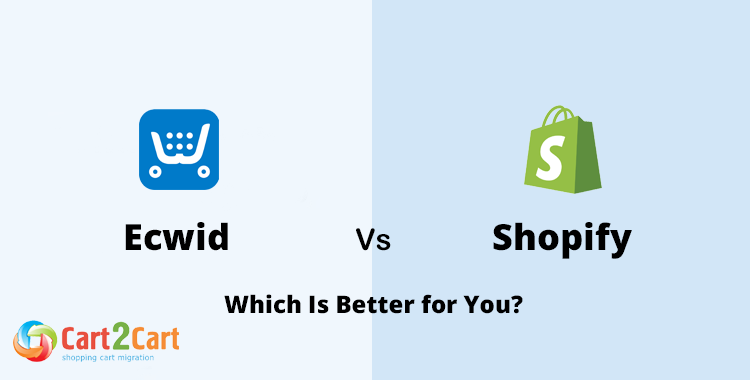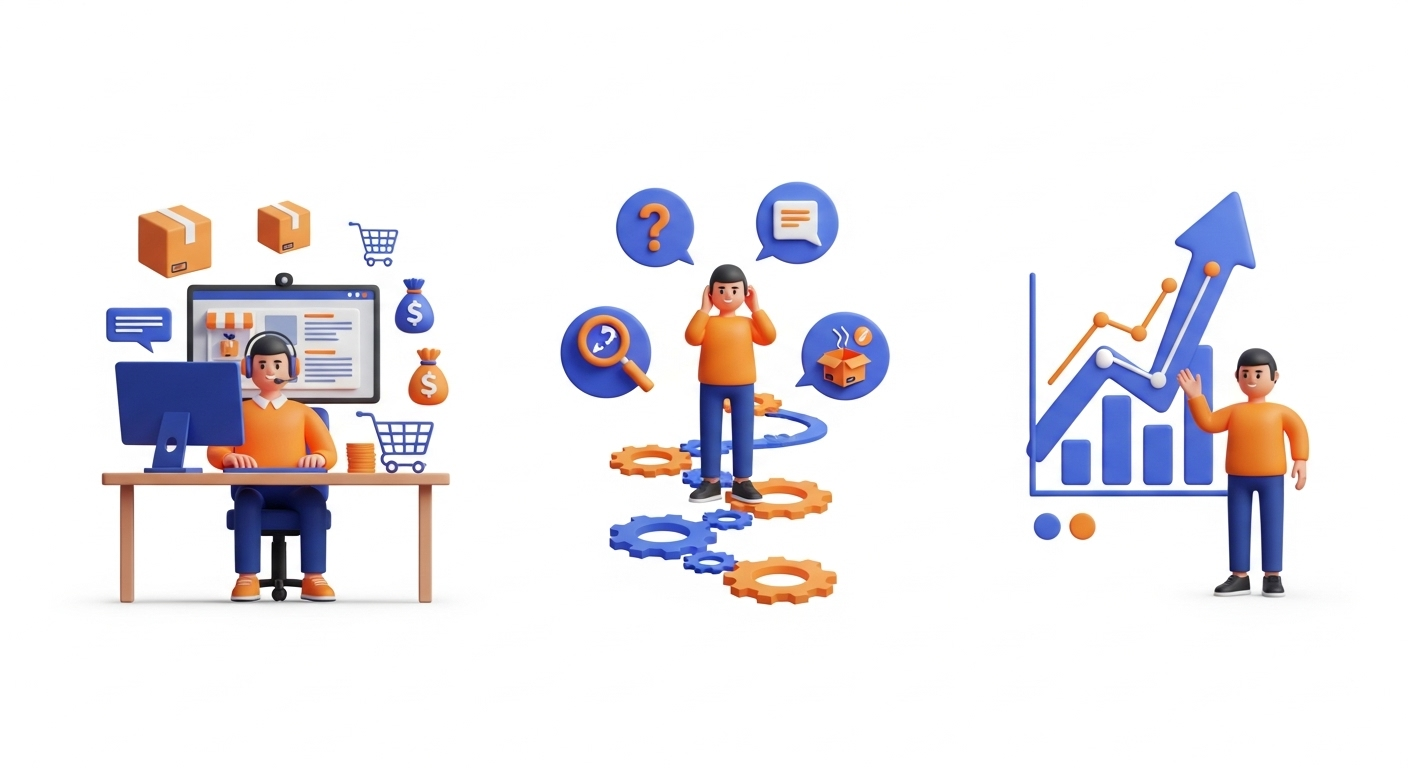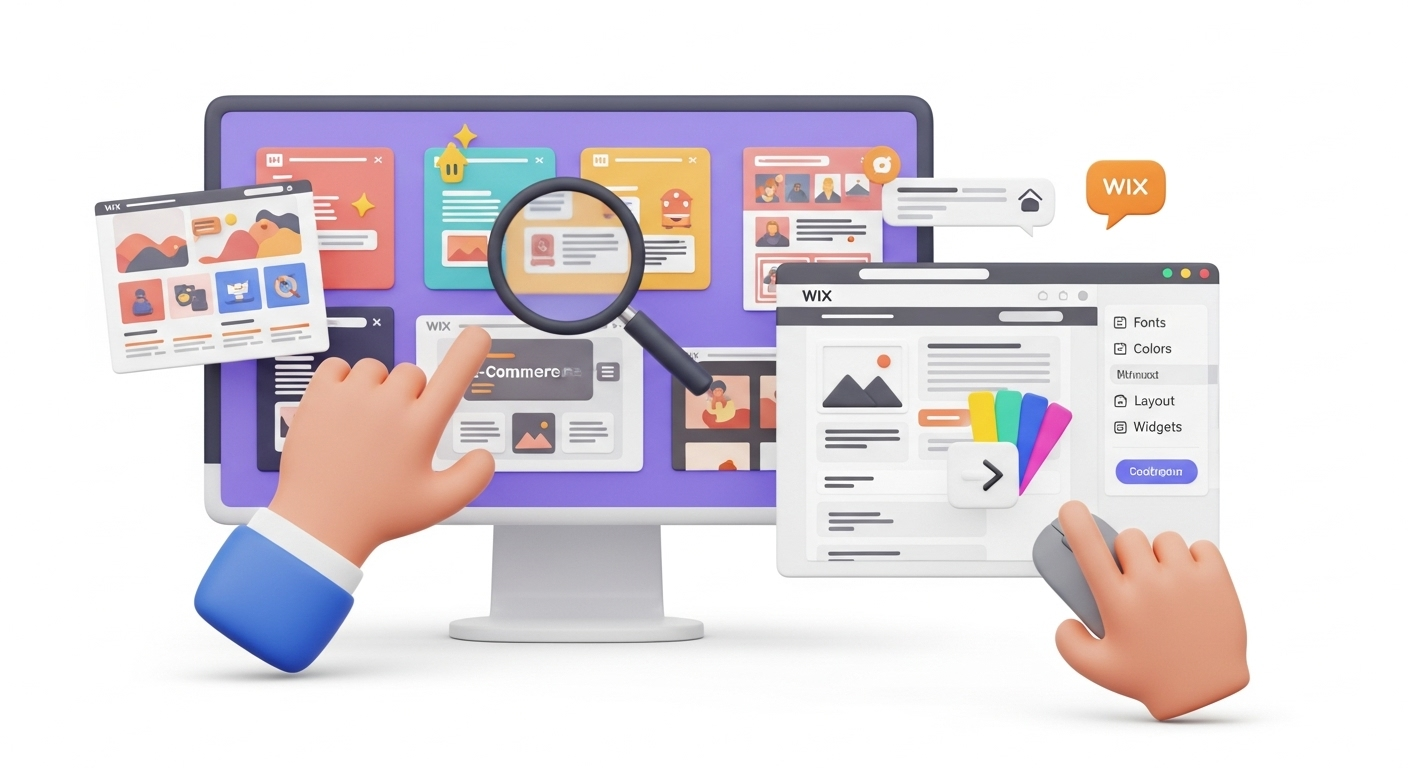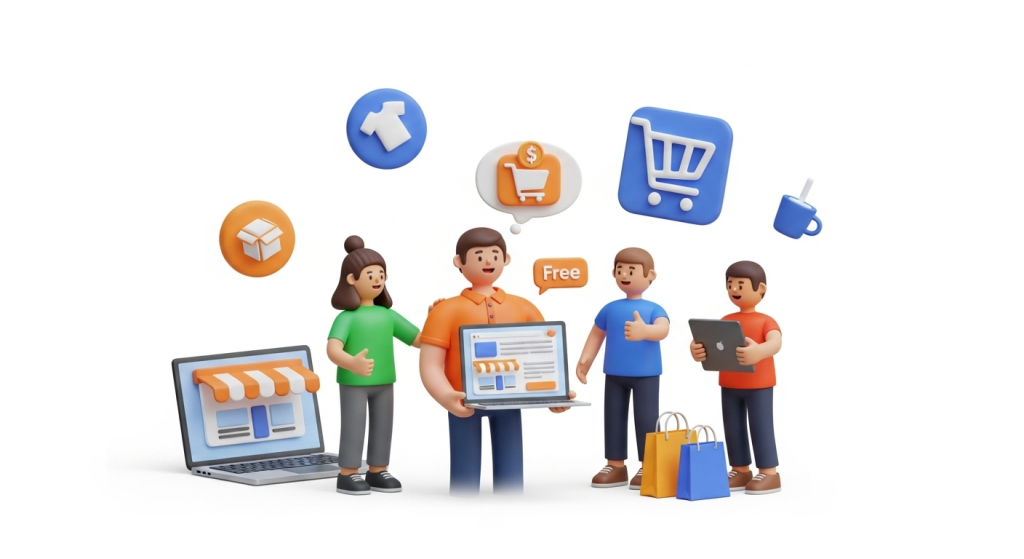Ecwid and Shopify are both e-commerce platforms that make it possible for internet users to sell products online. How do they differ, and which is the better one? Let's answer these questions.
Ecwid vs Shopify: a quick comparison
Ecwid is an e-commerce plugin that you can use to add e-commerce functions to your website so you can sell items. Shopify is an e-commerce platform that you can use to build a standalone online store. Both platforms are popular and successful, and they each power millions of online stores globally.
Shopify is software that allows the creation of an entire e-commerce site; Ecwid is an e-commerce plugin that turns existing websites into online stores.
Ecwid has an 'Instant Site' feature that facilitates the building of a standalone site as well, but with limited functionality.
If you’re considering switching from Shopify to another platform, such as WooCommerce, a shopify to woocommerce migration plugin can make the transition smoother.
Let's take a more detailed look at the two e-commerce solutions to understand the differences between them more clearly.
Ecwid vs Shopify: a side-by-side comparison
| Ecwid | Shopify | |
| Ease of Use | Easy to set up and integrate with existing websites. | User-friendly interface; designed for beginners. |
| Customization | Limited customization options. | Extensive customization with numerous themes and apps. |
| Pricing | Free plan available; paid plans (billed annually) from $19/month for Venture. | Plans start at $39/month, with additional costs for premium features. |
| Payment Options | Supports various payment gateways, including PayPal and Stripe. | Supports multiple payment gateways, including Shopify Payments, PayPal, and Stripe. |
| Integration | Easily integrates with existing websites and social media platforms. | Functions as a standalone platform with integrations to various apps and third-party services. |
| SEO & Marketing | Basic SEO tools and limited marketing features. | Advanced SEO tools, marketing features, and integrated blogging. |
| Support | Email and chat support, with phone support on higher tiers. | 24/7 customer support via phone, chat, and email. |
| E-commerce Features | Essential e-commerce features with add-ons for advanced functions. | Comprehensive e-commerce features, including abandoned cart recovery and gift cards. |
| Mobile Responsiveness | Mobile-friendly storefronts and management apps. | Fully responsive themes and a mobile app for store management. |
| Scalability | Suitable for small to medium-sized businesses. | Highly scalable, suitable for businesses of all sizes. |
Ease of use
Shopify is known for being easy to use, having been created specifically to enable anyone with no coding skills to create their own website. The dashboard is straightforward, and with the help of many stunning templates, it's possible to set up a store within minutes.
However, if you want to do your own thing, Shopify allows users to build their own websites from scratch.
Ecwid has a simple and attractive control panel and provides a wizard for setting up a store. The platform offers an 'Instant Site' feature to create a basic standalone site.
The time it takes to build a store varies between the two solutions. In the case of Ecwid, users that already have a website can integrate a store in minutes.
The new store’s built time for each platform also differs. In this regard, Ecwid, in case users have their current store running, takes little time to integrate into Ecwid. The process is straightforward. Ecwid seamlessly integrates with your website templates.
While Shopify is easy to use, it takes longer to build a proper store. However, a Shopify store is much more comprehensive, with more features and better functionality than one created with Ecwid.
Design
Ecwid is tailored for merchants who already have a website. You simply integrate Ecwid into your website, and the store is created.
If you don't have a website, you can use Ecwid to build one. With Ecwid, you can build a free website. This will give you access to Instant Site, a one-page website with a built-in online store that you can customize as you like.
Ecwid offers numerous predefined themes. The latest version of Instant Site provides customizable design blocks that make it possible to build a functional website.
Merchants can change the themes, which are all fully customizable, but remember, it's only a one-page store, so it's only suitable if you have only a few products to sell.
Shopify is the better option for users who want to build a brand-new, fully-featured, standalone online store.
The Shopify Theme Store offers both free and premium e-commerce templates available for every conceivable industry and category.
The website builder allows users to customize every aspect of their online store.
For anyone who wants to design a website from scratch, Shopify allows the use of CSS or HTML codes.
Features
Ecwid has all the features you need for an e-commerce store. You can sell physical and digital products.
All social media channels are integrated with Ecwid stores, so you can sell via Instagram, Facebook, and Google Shopping. Ecwid also offers point-of-sales (POS) integrations.
Ecwid is at the cutting edge with the latest trend of consumers buying from international stores. It provides localized storefronts for many languages, enabling translations of product labels, and more.
Other useful features include email automation, 50+ payment options, automated taxes, discount shipping labels, multiple currencies, and dropshipping.
Shopify is purpose-built for e-commerce, so it offers everything you need to sell online. The e-commerce features include dropshipping integration, flexible shipping rates, multi-language, various payment gateways, an extensive app store with thousands of apps, abandoned cart recovery, discount codes, and much more.
Other useful features include integration with social media platforms, chatbots to boost customer support, auto-calculation of shipping prices for each customer, and Shopify Payments and Shopify POS.
Pricing
Ecwid Pricing - price per month with a 1-year contract.
Freemium package, limited to 5 items - Free
Venture, limited to 100 products - $19
Business, up to 2,500 products, more integrations and phone support - $39
Unlimited, unlimited store items - $99
Shopify Pricing – price per month
Starter, sell products through social and messaging apps - $5
Basic, new e-commerce businesses with occasional in-person sales - $39
Shopify, for growing businesses selling online or in-store - $105
Advanced, for scaling businesses that require advanced reporting - $399
Shopify Plus, enterprise solution - starting at $2,500
SEO
Users are finding that Ecwid does not shine in this area. Ecwid automatically generates URLs for product pages based on the product title. When you change the title of a product, a new URL is automatically created, but it doesn't redirect to the new URL. There is no option to create a custom URL.
Ecwid also adds random numbers to the end of URLs, which is not good for SEO.
Shopify covers the essential aspects you need to have your site rank in search engines, including header codes and custom URLs. When you add products, Shopify makes suggestions for best SEO best practices.
Shopify has an extensive SEO features list that helps users to optimize their sites for ranking and fast-loading speeds.
Help & support
Both platforms offer comprehensive customer service, each with a YouTube channel, blog, educational videos, and user forum.
Ecwid offers comprehensive support, including the E-commerce Academy, live webinars, and email support on all plans. Live chat support is only available for the paid plans, and for the Business and Unlimited plans, a call-back service is available.
Shopify offers 24/7 customer support via email, live chat, and phone.
Ecwid vs Shopify - FAQs
What is the difference between Shopify and Ecwid?
Shopify is a complete e-commerce solution for anyone who wants to build an online store. Ecwid is an e-commerce plugin for existing websites. It can integrate into any platform and enable sales.
Can I build a standalone store with Ecwid?
Yes, you can use the 'Instant Site' feature, but it only lets you build a one-page store.
Can I use Shopify and Ecwid for free?
Yes, Ecwid has a free plan, and you can try Shopify out for free via the free trial. Shopify offers a free trial, often followed by a promotional offer for the first few months.
Conclusion
Leave a Reply Cancel reply
Shopify and Ecwid are both great e-commerce solutions. The big difference between the two is the scalability of Shopify stores. Shopify has various plans for scaling, allowing for high volumes of traffic. For businesses looking to grow, WooCommerce migration to Shopify can be a great option to take advantage of Shopify's robust infrastructure and scalability.
Meanwhile, Ecwid turns any website into an online store, allowing individuals and small businesses to thrive online.
What can we do for you?
If you are planning to migrate your website from or to Ecwid or Shopify (or any other platform), consider using the professional migration tool Cart2Cart. Cart2Cart facilitates the migration of small to mid-size stores, as well as large and enterprise-sized e-commerce stores. Your data is migrated safely and securely. You can learn more in our FAQ section.
Monthly Update – January 2026
The start of 2026 brings renewed focus on leveraging AI and advanced analytics for enhanced customer experiences in e-commerce. Retailers, whether operating on platforms like Ecwid or Shopify, are increasingly adopting predictive AI to personalize product recommendations, optimize pricing strategies, and streamline inventory management. This shift moves beyond basic algorithms, utilizing machine learning to anticipate individual customer needs and behaviors, thereby significantly boosting conversion rates and customer loyalty. Mobile commerce continues its rapid ascent, necessitating perfectly optimized, frictionless shopping experiences on smartphones and tablets. Progressive Web Apps (PWAs) are gaining traction as a solution, offering app-like performance within a web browser, which is crucial for reducing bounce rates and improving engagement. Furthermore, environmental consciousness remains a driving force, with consumers actively seeking brands that demonstrate transparent sustainability practices. Integrating ethical sourcing and eco-friendly shipping options directly into the customer journey is no longer a niche, but a mainstream expectation. Businesses that prioritize these technological and ethical considerations will be best positioned for growth throughout 2026 and beyond.
For more details, explore our FAQ section or schedule a call with a migration expert.








